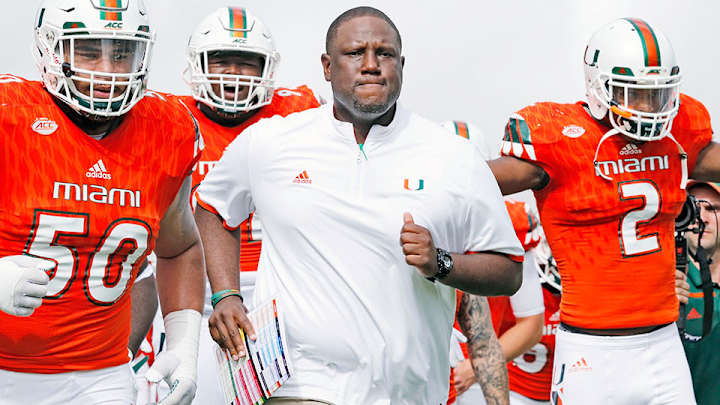Interim Miami coach Scott making mark in audition for permanent role

As Clemson coach Dabo Swinney walked off the field after his team’s 58–0 road blowout of Miami last month, then-Hurricanes tight ends coach and run game coordinator Larry Scott watched from afar.
Little did Scott know that just over 24 hours later, he would get his start as a collegiate head coach the same way Swinney did—in an interim capacity. And after taking over a lackluster Miami team that seemed hopeless at the time of Al Golden’s firing, Scott has resuscitated the Hurricanes.
The 39-year-old Scott has led them to an impressive 4–1 record, earning half of the team’s wins in just over a third of the season. That’s better than Swinney’s record before his interim tag was removed at Clemson at the conclusion of the 2008 regular season. Swinney went 4–2 to revive a Tigers team that had also underachieved.
Scott acknowledges the parallels between his and Swinney’s interim stints. Scott, a Florida native, has also made it clear that he wants to continue as Miami’s head coach.
USC makes right decision in naming Clay Helton permanent head coach
“You have to ask the question that’s being asked,” Scott says, “why not me?”
Like Swinney, Scott has orchestrated Miami’s turnaround with an energetic personal approach to his players. That’s something he tried to implement before the start of this season by convincing Golden to have Sunday night team dinners, which were also attended by the coaching staff’s families.
“Our disconnect with our team was too [much],” Scott says. “We need to connect to these young people. It’s all about relationships and connectivity. We wanted to make sure we got back connected with that locker room.”
Scott had participated in similar dinners as an assistant at South Florida from 2010–12 under then-Bulls coach Skip Holtz as part of Scott’s eight seasons working at his alma mater. He’s been an assistant at Miami the last three seasons.
“It puts us as coaches in an element where the players see us as people,” Scott says. “Not just as coach, but as father and husband and as the mentor I want every one of the coaches on the staff to be to these young people.”
But by the time Golden was fired, the Sunday dinners had lost their luster. On the Sunday that Golden was dismissed, the dinner was cancelled.
Two days later, junior cornerback Artie Burns’s mother, Dana Smith, died of a heart attack at the age of 44. Before her death, Scott had already made plans to resume the Sunday dinners. When Miami had its first dinner after that difficult week, one capped by its controversial eight-lateral miracle touchdown to stun then-No. 22 Duke 30–27, it suddenly meant a lot more to Scott’s players.
“This isn’t just a meal,” Scott recalls telling his players. “This is an opportunity for us to share and create memories. To create a brotherhood.”
As Scott spoke, his players soaked up his words.
“It’s truly about those little details,” Scott says. “These family-oriented characteristics. This is what it’s about. To tap back into these guys to get them to play with the kind of energy and passion we want them to play with.”
Mark Richt won big at Georgia, but failed to meet massive expectations
That’s what the Hurricanes have done under Scott. Their lone loss came at No. 14 North Carolina on Nov. 14, and they’ve bounced back since with wins over Georgia Tech and at Pittsburgh.
Besides the Sunday dinners, Scott also made his team’s dinner the night before games more relaxed in an effort to improve team camaraderie through conversation and laughter. He plans to call the meal “Unite Friday” if he’s retained as Miami’s coach.
“We want our players to enjoy each other,” Scott says. “Build a brotherhood that’s going to last a lifetime.”
Since becoming interim coach, Scott has also made changes to the way Miami practices, putting his team in what he calls “sudden change” situations.
That’s means right after stretching drills having his defense line up to try to stop a third-and-goal from the one-yard line. He’s also put his offense in a similar situation with a fourth-and-goal from the opponent’s nine-yard line needing a touchdown to win.
“These things happen during games, and you’ve got to be able to adjust and change right now,” Scott says. “It’s taking out those most stringent and difficult situations just to get the natural reaction to those. Don’t let those surprise us. Don’t let that come up and catch us off-guard.”
Scott also reduced the length of his team’s practices to generally 90 minutes, shaving 15 to 30 minutes off Golden’s sessions. That’s allowed Scott to have more competitive practices and keep his players fresher. He also significantly reduced the number of team meetings each week to three and simplified what his players are told.
Heartbreak aside, Notre Dame happy with independent plan in playoff era
“That way the message delivered is always impactful and doesn’t have to be sustained for so long,” Scott says.
On the field, Miami’s offense has upped its tempo under Scott with quicker play calls and by being faster out of the huddle.
“You think about Miami, it’s South Florida and speed,” Scott says. “It’s rhythm. It’s to fit the personality of our players.”
It’s all part of Scott’s plan to restore the pride of the Hurricanes and again have them among college football’s elite.
“You just didn’t come to the U to stand behind the U’s shield,” Scott says. “It’s your job and duty to uphold the U when you chose to come to the University of Miami. It’s a unique, special place.”
One that Scott is ready to continue to lead, just like Swinney has done at Clemson.
“At this point, do I feel I can do this?” Scott says. “Absolutely.”
